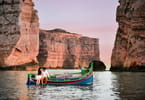A village at Inle Lake in southern Shan State has agreed to become a plastic bag-free zone, and the project’s backers say they hope the initiative will spread to other areas of the popular tourist destination.
Residents in Nga Phe Chaung agreed to stop using plastic bags on August 7, as part of a project being implemented by the Save the Nature Tour Guide Community Group.
The group was established by 11 local tour guides in June to conduct environmental conservation and awareness-raising programs in the Inle area.
The group has since expanded to 60 members and has received limited funding from government departments and non-government organisations, including the hotel and tour guide associations.
“Villagers use plastic bags and they often end up in the lake. They can block water flow, damage soil, increase water pollution and even kill fish, so we decided to launch a campaign to decrease the use of plastic bags in the area as much as possible,” said member Ko Sai Win.
“We decided to start it first in Nga Phe Chaung because this village is in the centre of the lake and many foreigners come to visit the historic monastery there. It was also easier to persuade villagers in Nga Phe Chaung to stop using plastic bags because there are only 240 residents,” he said.
“We reached an agreement to establish the zone after meeting and negotiating with the village administrator three times. The residents also agreed to the plan and we held an opening ceremony [on August 7]. This ceremony was attended by the Deputy Minister for Sport, U Aye Myint Kyu, and other officials.”
There are 294 villages in the vicinity of Inle Lake and the group plans to conduct educational talks in other communities to encourage them to give up plastic bags and adopt other eco-friendly habits. “We will gradually try to get other villages to also introduce a zone but it will take some time to eliminate plastic bags,” Ko Sai Win said.
“I think it’s our duty to conserve Inle Lake because it is a part of our natural heritage. We welcome everybody to join our group and participate in our activities.
U Sein Tun, head of the Inle Lake Wildlife Sanctuary, said residents had become more active in environmental conservation activities, which boded well for the lake’s future.
“Although the government and local and international organisations can cooperate and implement conservation projects, they can’t be successful without the participation of residents,” he said.
“We will also support the introduction of plastic bag-free zones in other villages … our department plans to implement an anti-plastic bag campaign from October.”
Daw Marlar, a resident of Inn Paw Kone village, said: “I’m willing to support the no plastic bags campaign at our lake. Our daily life depends on the health of Inle – it supports us so much – so we are also trying to reduce the use of fertiliser on our tomato plantations and listen to the advice of agriculturalists.”
WHAT TO TAKE AWAY FROM THIS ARTICLE:
- Our daily life depends on the health of Inle – it supports us so much – so we are also trying to reduce the use of fertiliser on our tomato plantations and listen to the advice of agriculturalists.
- There are 294 villages in the vicinity of Inle Lake and the group plans to conduct educational talks in other communities to encourage them to give up plastic bags and adopt other eco-friendly habits.
- They can block water flow, damage soil, increase water pollution and even kill fish, so we decided to launch a campaign to decrease the use of plastic bags in the area as much as possible,” said member Ko Sai Win.






















